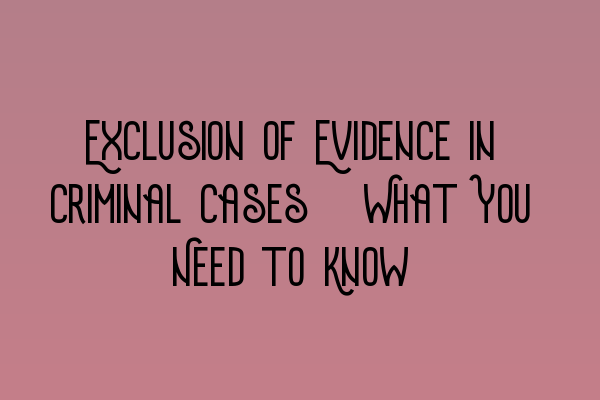Exclusion of Evidence in Criminal Cases: What You Need to Know
As criminal law solicitors, we understand the importance of gathering and presenting evidence in a criminal case. However, not all evidence is admissible in court. The exclusion of evidence is a crucial aspect of the criminal justice system, as it ensures that unfair or unreliable evidence does not taint the proceedings. In this article, we will discuss what you need to know about the exclusion of evidence in criminal cases.
What is the Exclusion of Evidence?
The exclusion of evidence refers to the legal process through which certain evidence is deemed inadmissible in court. This means that it cannot be presented or relied upon during the trial. The exclusionary rule exists to protect the rights of the accused and maintain the integrity of the criminal justice system.
There are various reasons why evidence may be excluded in a criminal case. These include:
- Violation of Constitutional Rights: If the evidence was obtained through an unconstitutional search or seizure, it may be excluded. The Fourth Amendment protects individuals from unreasonable searches and seizures by the government.
- Improper Collection or Handling: Evidence that has been contaminated, tampered with, or mishandled may be excluded if it undermines its reliability or authenticity.
- Violation of Privilege: Certain types of evidence, such as attorney-client communications or doctor-patient confidentiality, may be privileged and therefore protected from disclosure.
- Hearsay: Hearsay evidence, which is an out-of-court statement offered to prove the truth of the matter asserted, is generally excluded unless it falls within a recognized exception.
- Unfair Prejudice or Irrelevance: Evidence that is unduly prejudicial, irrelevant, or has a minimal probative value may be excluded to prevent unfairness to the accused.
These are just a few examples of the grounds on which evidence may be excluded in criminal cases. The decision to exclude evidence rests with the judge, who will assess the admissibility of the evidence based on the applicable laws and rules of evidence.
The Impact of Excluded Evidence
When evidence is excluded in a criminal case, it can have a significant impact on the outcome of the trial. Excluded evidence may weaken the prosecution’s case or prevent the defense from presenting a complete defense. It is important for both the prosecution and defense to understand the rules surrounding the admissibility of evidence in order to anticipate and prepare for any potential exclusions.
Excluded evidence can also affect the perception of the parties involved in the trial. If the excluded evidence is highly prejudicial or damaging, it may create doubts in the minds of the jury or the judge about the fairness of the proceedings. This highlights the importance of carefully examining the admissibility of evidence and ensuring that only reliable and relevant evidence is presented in court.
Seeking Legal Assistance
If you are involved in a criminal case, it is crucial to seek professional legal advice to navigate the complexities surrounding the exclusion of evidence. At SQE Criminal Law & Practice Law UK, our team of experienced criminal law solicitors can provide you with the guidance and representation you need.
For further information about criminal law and practice, SQE preparation courses or SRA SQE exam dates, please visit the following links:
- SQE 1 Practice Exam Questions
- SQE 1 Practice Mocks FLK1 FLK2
- SQE 2 Preparation Courses
- SQE 1 Preparation Courses
- SRA SQE Exam Dates
Our team is dedicated to helping you understand your rights, build a strong defense, and navigate the criminal justice system with confidence. Contact us today for a consultation.
